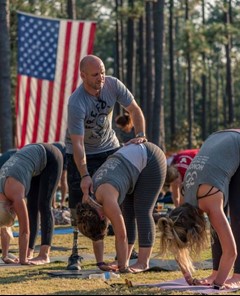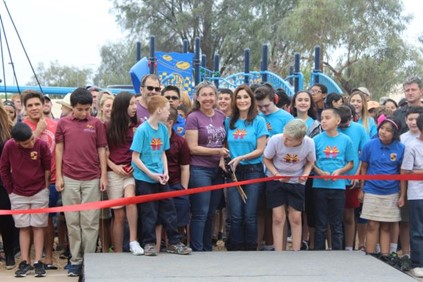Built On Purpose: What’s Inside A Meaningful CSR Program

In 1999, most customers weren’t worried about where a screen-printed t-shirt came from or how an engraved pen was made. As long as their logo looked right, they were happy. Flash forward 20 years and that same conversation plays out very differently. Today’s consumers want to know where an item was made, if the people making it are paid and treated fairly, what resources are used (and wasted) in its creation, and that every step of the supply chain is safe, compliant and ethical. Modern buyers want to know more than if the item is worth their money—they want to know if you are.
Corporate social responsibility, or CSR for short, is the idea that companies should be held accountable not just to their bottom line, but to the world around them. As clients become more choosey about how they allocate their marketing dollars, a company’s donations, volunteering and community outreach can become deciding factors when selecting a supplier or distributor. Just as each of us want to surround ourselves with people who share our values, corporations want to ensure their partners’ beliefs align with their own.
“A CSR provides organizational clarity,” says Roger Burnett, CAS, founder of distributor Social Good Promotions in Brighton, Michigan, and co-founder of PromoCares, a 100 percent industry volunteer initiative. “If you’re not sure whether or not a decision you need to make is the right decision, a CSR policy might serve as a willing arbitrator for that choice.”
Whether you want to do good for your community or for your company’s image, introducing a CSR program may be the answer. With countless industry programs and local nonprofits supporting a variety of causes, it’s easy to get started. There’s never been a better time to find out how social responsibility can be rewarding.
The Basics Of CSR
The ideas behind CSR have been part of the business lexicon for generations. At various times, it’s been known as corporate citizenship, corporate sustainability, conscious capitalism and sustainable business, but the essence is the same. A local business sponsoring a Little League team or a corporation holding a fundraiser for breast cancer awareness are both examples of socially responsible behaviors. Providing support for important causes is Business Operations 101, helping a company generate positive press while also providing tax incentives.
Corporate social responsibility differs from traditional corporate giving in two fundamental ways. First, a CSR program is a comprehensive, companywide effort, often centered around a particular mission. Forbes identified diversity, disaster recovery and ecological programs, information protection and inequality as some of the most common CSR focuses in 2018, but a company can just as easily concentrate on smaller efforts closer to home, such as volunteering at a local food bank or helping to build and beautify a community space. What’s important is that the program is sustained, that it provides team members an opportunity to contribute and that it benefits the community.
The other major difference from traditional corporate programs is in the philosophy—for a CSR program to work, the company and its associates need to have a genuine commitment to the cause. Consumers and even your own employees can tell if a business is only giving back to get a tax break or create some positive press. That outlook is not only cynical, but it’s also not sustainable, as employees are less likely to contribute to something they feel is ultimately selfish. Starting your CSR from a place of passion is crucial to making it a success.
“Regardless of whether you’re a supplier or distributor, it’s vitally important to understand the difference between wanting to do this and being compelled to do it,” Burnett says. “Don’t make the choice in the name of getting more customers. Evaluate what’s important to the people working beside you and decide if there is something you collectively want to put some effort, energy and budget toward.”
Why Companies Commit To Care
The key word in CSR is “responsibility”: What your organization feels a responsibility to and for will dictate your program’s focus. As such, corporate sustainability can look very different from one business to the next. There is no one right way to introduce corporate responsibility to a company, meaning each supplier and distributor can define what it means for them and concentrate on what they believe is most important.
City of Industry, California-based supplier Sweda Company found its focus in 2016 at its national sales meeting. The company invited Dan Nevins, Iraq war veteran, double amputee and brand spokesman for outdoor equipment company Basecamp, to speak about his experiences and provide motivation to the team. “The theme of our national sales meeting was, ‘The Challenge: If it does not challenge you, it does not change you,’” says Kellie Claudio, senior vice president of sales and marketing. “His perspective was a powerful motivator for my sales team and inspirational for all Sweda employees.”


Supplier Sweda Company found its purpose when it invited Iraq war veteran Dan Nevins (above, right) to speak and lead a motivational yoga session at its 2016 national sales meeting. Since then the company has donated more than $250,000 in money and products to Nevin's foundation, the Warrior Spirit Retreat.
The company quickly developed a partnership with Nevins, committing its CSR program to supporting his Warrior Spirit Retreat, a nonprofit that helps wounded veterans overcome their physical and mental challenges.
At the PPAI Expo 2019, Sweda put its responsibility program front and center when company leaders presented Nevins with a $100,000 check to support his foundation. To date, Sweda Company has donated more than $250,000 in money and product to the Warrior Spirit Retreat. “It has filled our hearts with tremendous joy to support this program,” Claudio says.
While Sweda found its motivation in that way, supplier Above & Beyond in Irvine, California, found its purpose halfway around the world. “In 2003, my brother and I went to India to meet with a factory, and we couldn’t believe the poverty and how many children were on the streets,” says Paul Chaklos, sales manager. Upon learning how many women and children in India were homeless and alone, they started working with an orphanage in the country, which eventually led them in 2005 to Mercy Homes, an organization that has provided housing for at-risk youths for more than 100 years. “In 2008, we really understood how the program worked and decided to open our first Mercy Home in Tijuana, Mexico,” Chaklos says. Since then, Above & Beyond’s philanthropy has expanded even further, currently caring for 188 children in seven countries. “We’ve been helping children for 15 years now, and it is so rewarding to see the children grow up in the program and fulfill their dreams,” he adds.
Whether local or global in focus, the most important part of any company CSR is its heart. The greatest mission won’t be a success unless your employees and coworkers share a passion for the project.
“Find an organization that fits your brand and matters to your goals,” says Eileen Spitalny, co-founder and sales and PR team leader at supplier Fairytale Brownies. The Phoenix, Arizona, baked goods supplier found that fit with KaBOOM!, a national nonprofit dedicated to giving all children a safe place to play. “When you believe in the organization, supporting it will be fulfilling and joyful. And the more you give, the more you receive in so many ways,” she says.


(Above, left) Fairytale Brownies founder Eileen Spitalny and her business partner David Kravetz try out the playground eqipment purchased through its ongoing support of KaBOOM!, a national nonprofit. (Above, right) The pair take part in opening a playground which the company helped fund.
Starting Your Program
There may be hundreds of motivations in social responsibility, and thousands of organizations and missions to support, but all of those programs begin with someone finding their passion. To introduce CSR to your company, you must first identify the social good you want to do.
When trying to answer that question, remember that “you” isn’t just you, but your entire business. You may harbor a deep commitment to a specific charitable organization, but if your staff and coworkers don’t share that same motivation, support for your program will be weak. If you aren’t sure what that unifying mission could be, talk to the people around you.
“Take a look to see if people are already doing something charitable behind the scenes that could be developed into a program or canvas the company to see what ideas they might have or causes that may be close to their company and employees,” says Devin Piscitelli, CEO of Akron, New York-based supplier Aakron Line. The family-owned company has supported NAEIR (National Association for the Exchange of Industrial Resources) since 2000 and, in that time, has donated more than $7 million in products to help schoolchildren. The company’s current Buy One, Give One program allows distributors to buy from 10 product categories that initiate like donations to NAEIR. He says if there is already a group of people driving a cause, it can be helpful to bring them into the decision-making process and leverage their passion and experience to strengthen the CSR. “Form a committee to lead the program and have a team that can do the brainstorming, the implementation, the promotion and the maintenance,” Piscitelli says.
Having internal advocates can help to quickly get your CSR off the ground, but don’t forget to do your due diligence. Even nonprofit organizations committed to improving lives can have questionable leadership—Livestrong is a perfect example—or may donate a much smaller portion of proceeds to their mission than you would expect. “Check on the administration costs,” Chaklos explains. “Some charities only give 20 to 40 percent to the end cause, and 60 to 80 percent goes to administration costs.”

Above & Beyond's Mike Chaklos, third from right, and his son Noah, fourth from left, were in Kipsongo, Kenya, in January to oversee the company's Mercy Home program. Pictured with them are Elizabeth Ramati, center, and her five children ages six to 15, and Pastor Benjamin Simiyu, second from right, director of Kenya Mercy Homes.
Another consideration when deciding on partners is determining whether it makes more sense to focus on a global or local cause. Working with an organization like Susan G. Komen for the Cure can add name recognition to your efforts and also ensures your work is going toward a legitimate operation, but for some suppliers and distributors, working with lesser- known organizations can have a bigger impact. “We feel that smaller organizations need both funds and exposure,” says Rod Brown, CFO for Pleasanton, California-based distributor MadeToOrder, who has traveled to Africa at least five times in the past decade to bring food and supplies to orphanages and schools in need. “If we could introduce them to our peers, vendors and clients, then perhaps they could benefit from these eyeballs on what they’re doing.” There are benefits to both large and small operations, so find what works best for your goals and your company.
Once a mission has been identified and excitement has been generated, it’s time to follow through and put CSR into action. Create a calendar with regular events so the program remains top-of-mind within the company, and so more people have more opportunities to contribute. To keep employees interested and motivated, circulate updates about the CSR program’s progress, highlighting coworkers who have gone above and beyond in support of the pledge. If you’re asking people to volunteer, be flexible and accommodating with their schedules, and allow them to log hours on the project during their normal shift—if you’re asking them to give, you have to be willing to give a little as well.
When you’re developing your program, be sure to keep it fun. Coworkers will be more motivated to help if they enjoy doing the work. Not only will this keep the team invested, it’s also good for the people and organizations being served. Whether you’re serving food at a soup kitchen, working with patients at a children’s hospital or raising money to combat lifelong illness, your work may be the most positive moment of another person’s day, so stay energized. Corporate social responsibility is about helping other people, so make sure to put those people first. Doing good feels good, so the more your program helps others, the more your team will get out of it.
“It is difficult to measure this, but I feel that the most visible sign [that CSR programs work] is through our coworkers’ pride and self-esteem,” Piscitelli says. “We all are happy to be a part of something greater and to have the opportunity to enrich someone else’s life.”
––––––––––––––––––––––––––––––––––––––––––––––––––––––––––––––––––––––
Kyle A. Richardson is a writer and editor living in Philadelphia. He is the former editor-in-chief of Promo Marketing magazine. www.karichardson.com.

